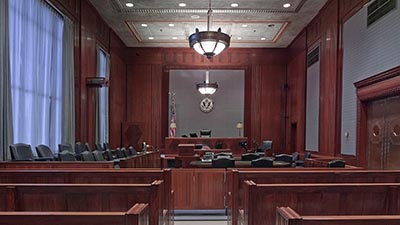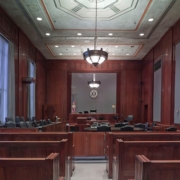United States Supreme Court’s New Open Door Policy for Federal Taking Claims
May 2023 / by John D. Pinzone / taken from Your House Counsel, Insurance & Corporate Liability Defense Reporter – Central Regional Edition
 A property owner’s right to use his or her real property in a lawful manner has been a cornerstone of property ownership in the United States. Of course, property ownership has long been subject to a governmental taking via either physical invasion or regulatory action. State constitutions and statutory provisions, as well as the Fifth and Fourteenth Amendments of the U.S. Constitution, require that a governmental entity provide compensation for the appropriation or taking of private property.
A property owner’s right to use his or her real property in a lawful manner has been a cornerstone of property ownership in the United States. Of course, property ownership has long been subject to a governmental taking via either physical invasion or regulatory action. State constitutions and statutory provisions, as well as the Fifth and Fourteenth Amendments of the U.S. Constitution, require that a governmental entity provide compensation for the appropriation or taking of private property.
It is imperative that governmental officials, as well as property owners, understand state and federal law defining the elements of taking private property, to obtain or avoid the payment of compensation due to a governmental deprivation of property rights. And recently, there’s been a change.
Before 2019, a legal rule was expressly established by the U.S. Supreme Court’s decision in Williamson County Regional Planning Commission v. Hamilton Bank of Johnson City, to foreclose a landowner from pursuing a federal claim under the Fifth and Fourteenth Amendments until the property owner exhausted all available state administrative remedies for compensation. The 2019 U.S. Supreme Court decision in Knick v. Township of Scott, Pennsylvania eliminated that long-standing rule.
In Ohio, the state constitution, enforced by way of a statutory mandamus action to compel compensation for a taking, represents Ohio’s available administrative remedy to a property owner for a compensatory taking. Under the previous Williamson ruling, an Ohio property owner could not bring a federal Fifth Amendment compensatory taking claim until they exhausted a mandamus action for a taking and were denied compensation in state court.
The U.S. Supreme Court in Knick overruled the Williamson precedent and now allows a property owner to immediately file a federal taking claim under the Fifth Amendment without exhausting state administrative remedies.
As anticipated by the dissent in Knick, by discarding the Williamson precedent, the Court has opened a Pandora’s box implicating significant federalism concerns. The Knick dissent stated: “Today’s decision sends a flood of complex state-law issues to federal courts. It makes federal courts a principal player in local and state land-use disputes.”
In addition, the Knick decision creates numerous novel legal questions. For example: When a federal and state taking claim are brought contemporaneously in the same lawsuit, which has priority? Does qualified immunity apply to a federal taking claim? Is the compensation for a taking determined by federal or state law? Are attorney fees available for a federal taking claim?
Lost in the wake is what the Knick decision left untouched from the Williamson decision. Specifically, Knick did not overrule Williamson’s finality requirement for a regulatory taking claim. Under Williamson, the legal rule remains that a federal regulatory taking claim is not ripe until the local governmental entity has made a “final” decision regarding application of the regulation to the property at issue. This generally means that a property owner must first exhaust all local administrative remedies available before a “final” decision has been made by the local governmental entity before filing a federal claim. For example, if a property owner was denied a zoning amendment by a local government, but still has available a legitimate remedy via a separate zoning use variance, then the denial of the zoning amendment is not a “final” decision and, per Williamson, a taking claim would not be ripe for the property owner to submit to the federal courts.
The nuances and complex legal issues created by the Knick decision muddy what were already murky waters when evaluating taking claims. As a result, legal expertise relating to taking claims is necessary to navigate the legal landscape. MRR Law has extensive experience consulting and defending governmental entities in taking claims and property disputes. We will provide you with the legal knowledge and advice for a successful outcome.



